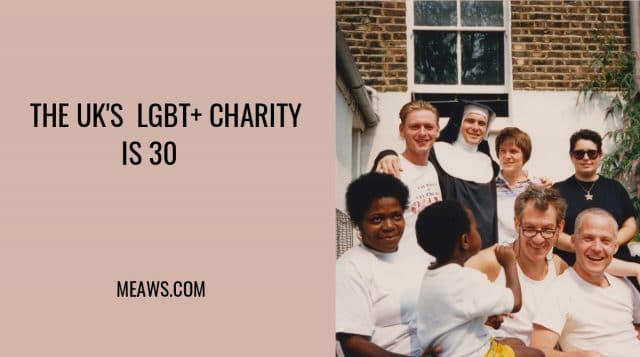
Stonewall, the UK’s foremost LGBT+ charity, is celebrating its 30th birthday on Friday (May 24) with a look back at its past victories.
For three decades Stonewall has fought for the rights of lesbian, gay and bisexual people across Britain, and has been trans-inclusive since 2015.
To celebrate its milestone anniversary, the charity is launching a new campaign highlighting the changes of attitude towards LGBT+ people over the past 30 years, and the challenges still facing the community.
When Stonewall was founded in 1989, Margaret Thatcher’s government had just introduced Section 28, the infamous law which prevented schools from discussing same-sex relationships.
The charity was conceived at the dining table of Sir Ian McKellen, one of the charity’s 14 founding members.
 Sir Ian McKellen speaking at an early Stonewall press conference. (Stonewall)
Sir Ian McKellen speaking at an early Stonewall press conference. (Stonewall)
“We formed a lobby to change Section 28 and get rid of it,” McKellen said.
“We were doing something that we knew had to be done at some point. We were fighting not on our own behalf, but also on behalf of kids.
–Sir Ian McKellen, Stonewall founder
The fight to abolish Section 28 completely took 25 years. It was first repealed in Scotland in June 2000, and in the rest of the UK in November 2003.
Along the way, Stonewall fought—and won—several other battles on behalf of LGBT+ people.
In 1994, its campaign to equalise the age of consent for gay men won an early victory when it was lowered from 21 to 18. The age of consent would eventually be brought down to 16—in lines with that for straight people–in 2001.
In 1995, the charity teamed up with Rank Outsiders to end the ban on LGB people serving in the British military. These restrictions were lifted in 2000.
 One of Stonewall’s most famous slogans. (Stonewall)
One of Stonewall’s most famous slogans. (Stonewall)
Throughout the following 19 years, same-sex couples won the right to marry and to adopt, while trans people were acknowledged and given legal protections.
As it enters its fourth decade, Stonewall continues to fight for equality, campaigning for reform of the Gender Recognition Act, marriage equality in Northern Ireland and LGBT-inclusive education in schools, working with 1,300 schools to deliver lessons and tackle bullying.
“I’m proud that Stonewall is now leading the fight in British schools where homophobic bullying ruins far too many young people’s lives,” said McKellen.
“As long as there is Stonewall, there is optimism.”
1989 – Founding of Stonewall
1991 – Sir Ian McKellen meets UK Prime Minister John Major
1992 – Stonewall begins its first major campaign for an equal age of consent in the UK
1994 – Age of consent lowered to 18
1994 – Same-sex kiss between two women on Brookside, builds on first kiss between two men on EastEnders
1994 – Rainbow Project heralds a new dawn for LGBT rights in Northern Ireland
1995 – Rank Outsiders and Stonewall launch campaign to end ban on LGB people openly serving in the British
military
1998 – Human Rights Act opens the door to LGBT rights
1999 – First Bi Visibility Day kicks off in Manchester
 Michael Cashman. (Getty)
Michael Cashman. (Getty)
1999 – Michael Cashman, Stonewall co-founder, becomes the first openly gay UK member elected to the European
Parliament.
2000 – Stonewall Scotland opens its doors – and helps take down Section 28
2000 – Lifting of the ban on LGB people serving in the military
2000 – Section 28 repealed in Scotland
2001 – Love wins! Age of consent equalised for gay and bi men.
2001 – Stonewall sets up the Diversity Champions programme
2002 – Same-sex couples free to adopt with the Adoption and Children Act
2003 – Section 28 repealed in England and Wales
2003 – Employment Equality (Sexual Orientation) Regulations comes into force
2003 – Stonewall Cymru opens
2004 – ‘Love that dare not speak its name’ is celebrated after Civil Partnerships Act passed
2004 – First Gender Recognition Act gives trans people a way to change their legal gender
2004 – UK Black Pride celebrated for the first time
2005 – Stonewall launches the Education for All campaign to tackle homophobic bullying in schools
2007 – Stonewall launches its iconic ‘Some People Are Gay. Get Over It!’ campaign
2008 – Prescription for Change – landmark remark on lesbian and bi women’s health
 The ban on LGB people serving in the military was lifted in 2000. (Stonewall)
The ban on LGB people serving in the military was lifted in 2000. (Stonewall)
2008 – Human Fertilisation and Embryology Act – it’s love that defines what makes a parent
2009 – Stonewall conducts the first large-scale study of lesbian and bi women’s health
2010 – The Equality Act 2010 officially adds gender reassignment as a protected characteristic
2012 – Stonewall starts to work with LGBT campaigners across the world
2013 – Stonewall sends Rainbow Laces to all the professional football clubs in the UK to encourage players to show
their commitment to making sport inclusive
2013 – First Trans Pride in the UK
2014 – Marriage Act means same-sex couples can tie the knot
2015 – Stonewall becomes trans-inclusive
2017 – Posthumous pardon for gay and bi men prosecuted under old sexual offence laws
2017 – Statutory Relationship and Sex Education – a big step forwards
2018 – UK Government launches consultation on reform to the Gender Recognition Act 2004







